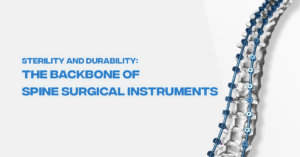
When it comes to spine surgery, precision isn’t the only priority. The sterility and durability of surgical instruments play a critical role in ensuring successful outcomes. Contaminated or compromised instruments can lead to infections, complications, and prolonged recovery times. That’s why every tool used in spine surgery must meet the highest standards of hygiene and strength.
Why Sterility Matters
Spinal procedures are intricate, requiring absolute precision in every step. Any trace of contamination can introduce bacteria into the patient’s body, increasing the risk of post-surgical infections. Hospitals and surgical centers follow strict sterilization protocols, but the quality of the instrument itself is just as important.
Manufacturers ensure sterility through materials that resist microbial growth and coatings that allow for easy sterilization. Single-use instruments also offer a safe alternative in cases where reusable tools might pose a risk. In an environment where even the smallest lapse can have serious consequences, sterility is non-negotiable.
The Role of Durability
Spinal surgery instruments need to be strong enough to withstand repeated use without losing precision. Unlike disposable tools, these instruments are designed for long-term use, requiring materials that are resistant to wear, corrosion, and mechanical stress.
Titanium and high-grade stainless steel are commonly used because they offer a perfect balance of strength and lightweight handling. A durable instrument ensures accurate incisions, stable fixations, and minimal risk of malfunction during critical procedures. When a surgeon operates, they need to trust that their tools will perform flawlessly every time.
Balancing Strength and Sterility
The challenge in designing spine surgical instruments lies in maintaining durability while ensuring effective sterilization. Instruments must endure high-temperature autoclaving, chemical disinfectants, and careful handling—all without degrading in quality. Innovations in material science and coating technologies help achieve this balance, making modern surgical tools easy to sterilize.
Looking Ahead
With advancements in biocompatible materials and anti-microbial coatings, the future of surgical instruments is evolving rapidly. The goal remains the same—to enhance patient safety, improve surgical efficiency, and ensure long-term reliability.
At GESCO, we prioritize sterility and durability in every instrument we manufacture because we understand that in spine surgery, the right tools make all the difference.
visit our website now now to know more.
